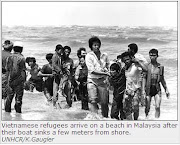Tan Thai’s life could be a novel or a movie. A Distinguished Member of the Technical Staff at Sandia National Laboratories in Albuquerque, Tan was a middle school teacher in Vietnam twenty-five years ago when Saigon fell to the communists.
The life Tan enjoyed while growing up in Vietnam changed drastically after that. His father, a businessman, lost everything. His younger brother, Loc, was drafted by the communists to carry ammunition. Tan could not see past a bleak future.
He says the strength and love of his mother motivated him and his older sister, Mai, to escape Vietnam. “Don’t cry,” she said, as they left. They were captured on their first attempt but were successful on their next attempt.“Successful” meant they arrived in a crowded boat at Pulau Bidong, asmall island off the east coast of Malaysia, after three days and nights at sea. Their journey included being robbed on three separate occasions by Thai sea pirates. The pirates threatened their lives and terrorized them. “Only by God’s grace did they let us go,” says Tan. The small wooden fishing boat was overcrowded with about 50 people of all ages. “People vomited
all around me, the odor was horrific,” says Tan. “My sister and I had some water but no food.” Their arrival in Pulau Bidong was also traumatic, but a happy surprise
awaited them. As Tan and Mai sat on the dock, their brother Loc appeared. They had not heard from Loc in a very long time, but he also had escaped. Loc told them he had gone every day to the only dock on the island in hope of seeing family members.
There were 6,000 refugees in Pulau Bidong when they arrived.They built their own houses from abandoned materials like plastic sugar bags and wood from trees harvested
from the island’s hills. Beds were constructed out of tree bark, later “upgraded” with wooden planks. “Our stay at Pulau Bidong lasted about six months,” Tan says. “Some refugees had to wait for five or six years if they didn’t have relatives or friends in any sponsoring countries. We were fortunate. My sister’s
husband had escaped in 1975 and lived in Dallas, so it took us only half a year of waiting in Bidong.” However, because of Loc’s health problem, Tan and Mai ended up
waiting another three months in a transit camp. As for Loc, it took him another six months to reach the U.S. Initially, they all lived together in Texas. About a year and a half after arriving in Dallas, Tan moved to
Arkansas where an aunt and uncle offered him a place to stay while attending the University of Arkansas. Tan’s degrees in electrical engineering brought him to Sandia
Labs in 1987 by way of AT&T. Today at Sandia, Tan does research and development for
computer security applications. He was promoted to Distinguished Member of Technical Staff in 2001. Tan and his wife Lan, a Vietnamese interpreter at the University of New Mexico, have three children, Hannah, Nathan, and Stephen. Tan also serves as a
biovocational pastor at a Vietnamese church. His nights and most of the weekend are filled with church work and family activities. His brother Loc works for
Boeing and sister Mai works for an electronics firm. They both live in Texas. Their mother died before her paperwork to enter the U.S. was completed. Tan became
a U.S. citizen in 1986 in Arkansas. Although he is glad that his children did not have to experience his quest for freedom, he hopes that they value what they have
in the U.S. “To me, mine is a typical American story,” says Tan.
http://nnsa.energy.gov/news/documents/2003SepOct_NNSA_News.pdf
Wednesday, November 5, 2008
Subscribe to:
Post Comments (Atom)




















No comments:
Post a Comment